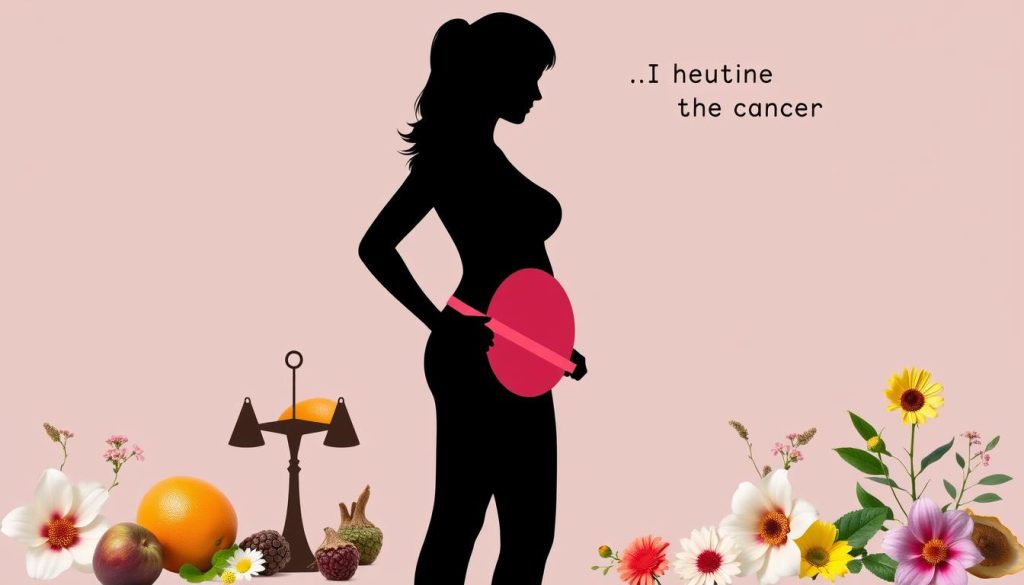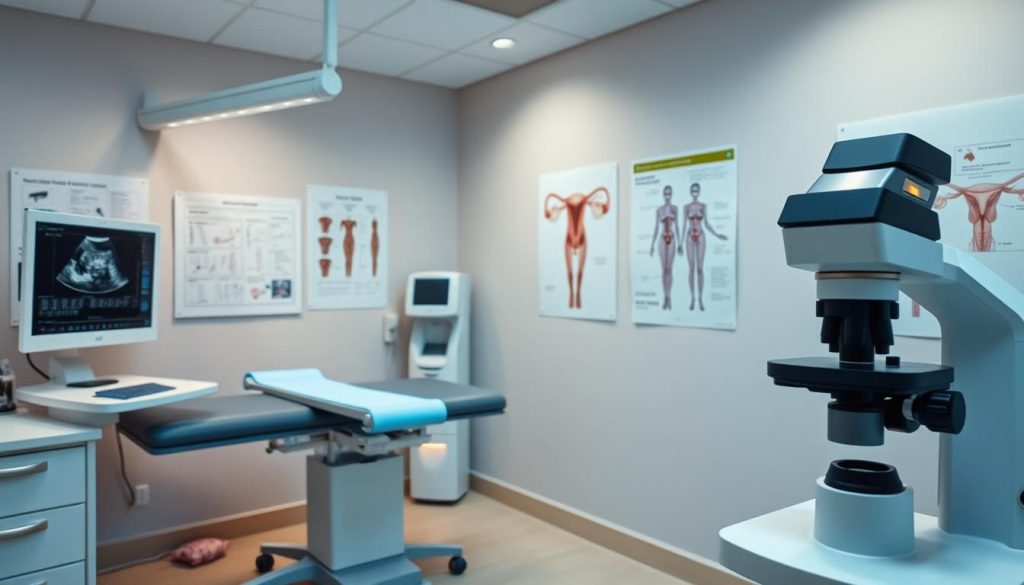Uterine cancer is a serious health issue for women around the world. Knowing the early signs of uterine cancer is key for quick diagnosis and treatment. This article aims to highlight the main signs of endometrial cancer, helping women take control of their health.
Understanding these symptoms can lead to early medical care. This could greatly improve treatment success. We’ll look at symptoms like changes in menstrual cycles and pelvic pain as early signs of uterine cancer.
It’s important for every woman to know about uterine cancer symptoms. This knowledge could save lives, keeping you alert and proactive about your health.
Understanding Uterine Cancer and Its Impact on Women’s Health
Uterine cancer is a serious health issue that affects thousands of women each year. It develops in the uterus, where a baby grows during pregnancy. Spotting uterine cancer symptoms early can greatly improve treatment chances.
Types of Uterine Cancer
There are two main types of uterine cancer:
- Endometrial cancer: This is the most common type, starting in the lining of the uterus.
- Uterine sarcoma: A rarer form that begins in the muscle wall of the uterus.
Risk Factors and Prevalence
Several factors can increase a woman’s risk of developing uterine cancer. Age, obesity, and hormonal imbalances are key contributors. The table below outlines common risk factors:
| Risk Factor | Description |
|---|---|
| Age | Most cases occur in women over 50 |
| Obesity | Excess fat tissue can increase estrogen levels |
| Hormone Therapy | Estrogen without progesterone increases risk |
| Diabetes | Type 2 diabetes is linked to higher risk |
Importance of Early Detection
Spotting endometrial cancer signs early is key for successful treatment. Regular check-ups and awareness of uterine cancer symptoms can lead to timely diagnosis. Women should watch for changes in their menstrual patterns and report any unusual bleeding to their healthcare provider promptly.
By understanding the risks and staying vigilant about symptoms, women can take proactive steps for their uterine health. Early detection often means more treatment options and better outcomes.
Common Uterine Cancer Symptoms to Never Ignore
Spotting uterine cancer early can save lives. Abnormal vaginal bleeding is a key warning sign. Women should watch for any unusual bleeding and see a doctor if they notice it.

Abnormal Vaginal Bleeding Patterns
Uterine cancer often shows up as irregular bleeding. This can be spotting between periods, heavy flow, or bleeding after sex. Keep track of your menstrual cycles and report any odd bleeding.
Changes in Menstrual Flow
Big changes in menstrual flow can mean uterine cancer. This includes longer, heavier, or more frequent periods. Talk to your doctor if you notice these changes.
Postmenopausal Bleeding Warning Signs
If you’ve gone through menopause, any vaginal bleeding is a big deal. Even a little spotting could be a sign of cancer. Don’t wait to see a doctor if you notice bleeding.
| Bleeding Pattern | Action Required |
|---|---|
| Spotting between periods | Consult doctor |
| Heavier than usual flow | Schedule check-up |
| Postmenopausal bleeding | Seek immediate evaluation |
Recognizing Pelvic Pain and Discomfort
Pelvic pain is a common issue for many women. It can sometimes signal a more serious problem. Pelvic discomfort is a key symptom to watch for when it comes to uterine cancer.
Uterine cancer often causes a dull ache or pressure in the pelvic area. This pain is different from typical menstrual cramps. It can be constant or come and go, and it might worsen over time.
Some women describe the sensation as:
- A heavy feeling in the lower abdomen
- Pressure on the bladder or rectum
- Pain during sex
- Discomfort that doesn’t go away
It’s important to remember that not all pelvic pain means cancer. Many other conditions can cause similar discomfort. Here’s a comparison of pelvic pain causes:
| Cause | Characteristics | Other Symptoms |
|---|---|---|
| Uterine Cancer | Persistent, worsening pain | Abnormal bleeding, weight changes |
| Endometriosis | Cyclic pain with periods | Heavy periods, infertility |
| Fibroids | Pressure, heaviness | Heavy periods, frequent urination |
| Ovarian Cysts | Sharp, sudden pain | Bloating, nausea |
If you have persistent pelvic pain or discomfort, it’s vital to see your doctor. This is true, even if you have other symptoms of uterine cancer. Early detection can greatly improve treatment outcomes.
Unexpected Weight Changes and Their Significance
Weight changes can be early signs of uterine cancer. It’s important to understand these changes for early detection and treatment. Let’s look at how weight shifts might signal this condition.
Rapid Weight Loss
Sudden weight loss without diet or exercise changes is a concern. Uterine cancer might cause appetite loss or metabolic changes. This leads to unexplained drops in weight. If you notice rapid weight loss, see your doctor right away.
Unexplained Weight Gain
On the other hand, some women experience unexpected weight gain. This can be due to fluid retention or tumor growth. Watch for sudden increases in weight, paying attention to your midsection.
Body Composition Changes
Uterine cancer can also change your body composition. You might notice changes in fat distribution or muscle mass. These changes often happen with other uterine cancer symptoms.

| Weight Change | Possible Cause | Action |
|---|---|---|
| Rapid Weight Loss | Appetite loss, Metabolic changes | Consult doctor |
| Unexplained Weight Gain | Fluid retention, Tumor growth | Monitor closely |
| Body Composition Changes | Hormonal imbalances | Seek medical evaluation |
Remember, weight changes alone don’t confirm uterine cancer. They’re often with other symptoms like abnormal bleeding or pelvic pain. If you experience unexpected weight shifts with other concerning signs, get medical advice quickly.
Persistent Fatigue and Energy Level Changes
Feeling tired is normal, but persistent fatigue is a warning sign. It’s more than just being tired and doesn’t get better with rest. Women with uterine cancer often feel a deep, lasting tiredness that impacts their daily life.
Cancer-related fatigue is different from regular tiredness:
- It’s not proportional to recent activity
- It interferes with usual functioning
- Rest doesn’t fully relieve it
- It’s often accompanied by other symptoms like weakness or difficulty concentrating
If you’re tired for weeks and it’s not normal, listen to your body. While fatigue alone doesn’t mean you have uterine cancer, it’s a symptom to watch. It’s important, though, when combined with other warning signs.
Keep track of your energy levels and any other changes. This info is helpful when talking to your healthcare provider. Early detection of uterine cancer symptoms can greatly improve treatment outcomes.
Urinary Symptoms and Bladder Changes
Uterine cancer can show up in different ways, like changes in how you pee. These signs are often missed or thought to be something else. It’s key to know these symptoms early for treatment.
Frequent Urination
Needing to pee more often might mean you have uterine cancer. A growing tumor can press on the bladder, making it smaller. If you pee a lot, even at night, talk to your doctor.
Difficulty Urinating
Having trouble peeing is another sign of uterine cancer. It could be a weak stream or feeling like you can’t empty your bladder. Some women also feel a burning or discomfort while peeing.
Urinary Incontinence
Leaking urine without meaning to, or incontinence, can also be a sign. It might happen when you cough, laugh, or move around. While many things can cause incontinence, it’s important to check for cancer.
| Urinary Symptom | Description | Action |
|---|---|---|
| Frequent Urination | Increased need to urinate, even at night | Keep track and see a doctor |
| Difficulty Urinating | Weak stream, can’t empty bladder fully, or feels uncomfortable | Get a medical check-up |
| Urinary Incontinence | Leaking urine without meaning to, during activities | Talk to your healthcare provider |
These changes in peeing can have many causes. But if you keep having trouble peeing, see a doctor. They can check for uterine cancer or other serious issues.
Understanding Back and Leg Pain Connections
Back pain and leg pain are common issues. But sometimes, they can point to serious health problems. In rare cases, these symptoms might be linked to uterine cancer. It’s important to understand this connection for early detection and treatment.
Uterine cancer symptoms often include pelvic discomfort. But they can also affect the back and legs. As tumors grow, they may press on nerves or blood vessels. This can cause pain that radiates to these areas.
Some key points to consider about back and leg pain related to uterine cancer:
- Pain often starts in the lower back and may spread to the legs
- Discomfort might worsen over time or with certain activities
- Leg pain can be accompanied by swelling or numbness
Back and leg pain are often caused by muscle strain or nerve issues. But if you have persistent pain and other uterine cancer symptoms, see a healthcare provider. They can do a thorough evaluation.
Early detection of uterine cancer can greatly improve treatment outcomes. If you notice unusual or persistent pain in your back or legs, seek medical attention. This is true, even if you have other symptoms of uterine cancer.
Digestive Changes and Bloating Symptoms
Digestive issues can be early signs of uterine cancer. Women should watch for persistent changes in their digestive system. These could signal a serious problem.
Persistent Bloating
Feeling bloated sometimes is normal. But, if bloating lasts for weeks, it’s a warning sign. This bloating doesn’t go away after passing gas or having a bowel movement. If you have ongoing bloating, see your doctor.

Changes in Bowel Habits
Uterine cancer can mess with your bowel movements. You might feel constipated or have diarrhea that doesn’t get better with usual treatments. These changes happen when a tumor presses on your intestines, changing how they work.
Abdominal Distention
Abdominal distention is when your belly gets bigger. It’s not just bloating. This swelling can come from fluid buildup or a tumor. If your belly looks bigger than usual for a long time, you should see a healthcare provider.
Keep in mind, these symptoms don’t always mean cancer. Many other conditions can cause similar problems. But, if these symptoms keep happening or get worse, it’s important to get checked. Finding uterine cancer early can greatly improve treatment results.
When to Seek Medical Attention
It’s vital to know when to see a doctor for uterine cancer symptoms. If you notice any unusual changes, get medical help right away.
Watch out for these signs of endometrial cancer:
- Abnormal vaginal bleeding or spotting
- Pelvic pain or pressure
- Unexplained weight loss or gain
- Persistent fatigue
- Changes in urinary or bowel habits
Don’t delay if you see these signs. Early treatment can make a big difference. If you notice any of these, see your doctor within two weeks.
Uterine cancer can happen at any age. Regular check-ups and talking openly with your doctor are key. They help keep you healthy and catch problems early.
Diagnostic Procedures for Uterine Cancer
Finding uterine cancer early is key to treating it well. Doctors use many tests to spot endometrial cancer signs. These tests help find the cause of symptoms and decide the best treatment.
Physical Examinations
A pelvic exam is often the first step in diagnosing uterine cancer. The doctor checks the uterus, cervix, and nearby areas for any oddities. This exam can show signs of uterine cancer, like big organs or unusual growths.
Imaging Tests
Imaging tests give detailed pictures of the uterus and nearby areas. These tests help doctors find endometrial cancer signs that might not be seen during a physical exam.
| Imaging Test | Purpose | Procedure |
|---|---|---|
| Transvaginal Ultrasound | Measures uterine lining thickness | Wand inserted into vagina |
| CT Scan | Checks for cancer spread | X-ray images from multiple angles |
| MRI | Provides detailed uterus images | Magnetic fields and radio waves |
Biopsy Procedures
A biopsy is the most surefire way to diagnose uterine cancer. It involves taking a small tissue sample from the uterus for a close look. There are several types of biopsies used to detect uterine cancer symptoms:
- Endometrial biopsy
- Hysteroscopy
- Dilation and curettage (D&C)

These tests work together to give a full check-up of uterine health. Spotting endometrial cancer signs early through these tests can greatly improve treatment results for women with uterine cancer.
Treatment Options and Recovery Expectations
When uterine cancer is diagnosed, patients have several treatment choices. The right one depends on the cancer’s stage, type, and the patient’s health. Surgery is usually the first step to treat uterine cancer. It might involve removing the uterus, fallopian tubes, and ovaries.
Radiation therapy uses high-energy beams to target cancer cells. It’s used after surgery or as the main treatment if surgery isn’t an option. Chemotherapy uses drugs to kill cancer cells all over the body. It’s often used for advanced or aggressive uterine cancer.
Hormone therapy is sometimes recommended for endometrial cancer. It blocks hormones that cancer cells need to grow. Targeted therapy and immunotherapy are newer options. They attack specific cancer cell features or boost the body’s immune system.
Recovery times vary for each patient. Most can get back to normal activities in 4-8 weeks after surgery. Common side effects include fatigue, pain, and emotional changes. Regular check-ups are key to watch for any signs of cancer coming back and manage symptoms.
- Surgery recovery: 4-8 weeks
- Radiation therapy: Daily treatments for several weeks
- Chemotherapy: Cycles over 3-6 months
Support groups and counseling help patients deal with the emotional side of treatment. Many women find it helpful to share their experiences with others going through the same thing. Remember, every journey is different, and a care plan tailored to you offers the best results.
Prevention Strategies and Lifestyle Modifications
There are steps you can take to lower your risk of uterine cancer. Making healthy choices every day can help keep you healthy. This might also lower your chance of getting endometrial cancer.
Diet and Exercise
Eating a diet full of fruits, veggies, and whole grains is important. Exercise regularly to keep a healthy weight. This is key in fighting uterine cancer.

Regular Check-ups
Going for regular gynecological exams is a must. These visits help doctors find uterine cancer early. This way, they can catch endometrial cancer signs before they get worse.
Risk Factor Management
Knowing and managing your risk factors is important. This means staying at a healthy weight, controlling diabetes, and talking to your doctor about hormone therapy.
| Prevention Strategy | Benefits | Implementation Tips |
|---|---|---|
| Balanced Diet | Reduces inflammation, supports immune function | Increase plant-based foods, limit processed meats |
| Regular Exercise | Maintains healthy weight, improves hormone balance | Aim for 150 minutes of moderate activity weekly |
| Annual Check-ups | Enables early detection of possible issues | Schedule yearly visits with your gynecologist |
| Risk Factor Awareness | Helps in making personalized prevention plans | Discuss family history and lifestyle with your doctor |
By adding these strategies to your life, you can help prevent uterine cancer. Remember, knowing the signs of uterine and endometrial cancer early is key. This leads to better treatment and outcomes.
Support Resources and Professional Help
Dealing with uterine cancer symptoms can feel overwhelming. But, you’re not alone. Support groups offer a safe place to share your experiences. You’ll find comfort with others who understand your journey.
These groups share valuable insights on coping with endometrial cancer signs and treatment side effects.
Professional counseling services are here to help with the emotional challenges of a uterine cancer diagnosis. Trained therapists can teach you how to manage anxiety, depression, and stress. Many cancer centers have social workers ready to connect you with these resources.
There are also financial assistance programs to help with medical costs. The American Cancer Society and other organizations offer grants, transportation, and lodging for patients. Don’t be shy to ask your healthcare team about these services. They’re here to support you every step of the way.
FAQ
Q: What are the most common symptoms of uterine cancer?
A: Symptoms of uterine cancer include abnormal vaginal bleeding and changes in menstrual flow. Postmenopausal bleeding, pelvic pain, unexpected weight changes, and persistent fatigue are also signs. Urinary symptoms can also point to uterine cancer. These symptoms can have other causes too, so it’s important to see a doctor.
Q: How is uterine cancer diagnosed?
A: Doctors use physical exams, imaging tests like ultrasound or MRI, and biopsies to diagnose uterine cancer. A biopsy is when a doctor takes a small tissue sample from the uterus. This sample is then checked under a microscope for cancer cells.
Q: Are there different types of uterine cancer?
A: Yes, there are different types of uterine cancer. Endometrial cancer starts in the uterus lining. Uterine sarcoma begins in the muscle or supporting tissues. Each type has its own symptoms, treatments, and outcomes.
Q: What are the risk factors for developing uterine cancer?
A: Risk factors include obesity, diabetes, high blood pressure, and estrogen-only hormone therapy. Never having been pregnant, late menopause, and genetic conditions like Lynch syndrome also increase risk. Most cases happen in women over 50.
Q: How is uterine cancer treated?
A: Treatment often involves surgery to remove the uterus. Depending on the cancer’s stage and type, treatments like radiation, chemotherapy, or hormone therapy might be added. The treatment plan is made just for each patient.
Q: Can uterine cancer be prevented?
A: While preventing uterine cancer is not guaranteed, some lifestyle choices can help. Staying healthy, managing chronic conditions, and discussing hormone therapy with your doctor are important. Regular check-ups and reporting unusual symptoms are also key.
Q: Is bloating a sign of uterine cancer?
A: Bloating can be a symptom of uterine cancer, but it’s not always a sign. It can also be caused by many other conditions. If you have persistent bloating, it’s best to talk to a healthcare provider.
Q: Can back pain or leg pain be related to uterine cancer?
A: Back pain or leg pain can be related to uterine cancer, but it’s not the only cause. These symptoms may occur if the cancer spreads or presses on nerves or blood vessels. Any persistent pain should be checked by a healthcare professional.
Q: What should I do if I experience symptoms that might be related to uterine cancer?
A: If you have symptoms like abnormal vaginal bleeding, pelvic pain, or unexplained weight loss, see a doctor right away. Make an appointment with your gynecologist or primary care physician. Early detection is critical for better treatment outcomes.

















